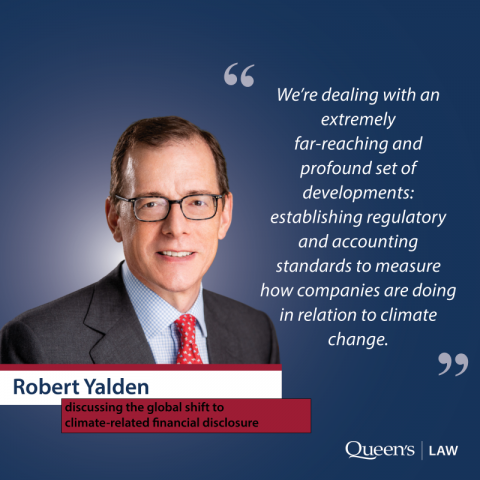
Part four of an eight-part series featuring legal insights from Queen’s Law scholars and practitioners
Global shift to climate-related financial disclosure and sustainable accounting
“A seismic shift” is how Professor Robert Yalden, Stephen Sigurdson Professor in Corporate Law and Finance, describes the financial markets’ move towards measurable and standardized climate-related financial disclosure and sustainable accounting. Securities regulators, investors, creditors, corporate directors, auditors, insurance underwriters, credit-rating agencies, and other financial world participants are seeking, even demanding, access to consistent, comparable, reliable, and clear information from organizations on their climate-related risks and opportunities, not sloganeering.
“It’s a fascinating time,” Yalden says. “We’re dealing with an extremely far-reaching and profound set of developments: establishing regulatory and accounting standards to measure how companies are doing in relation to climate change.”
The triple bottom line of social equity, economic, and environmental factors has moved to centre stage globally. “There was a time when the dominant business law discourse was about shareholder value and how to measure whether it’s being maximized,” he explains. “Companies and boards didn’t want to be bound by responsibility for the squishy, soft things that are hard to measure. It’s very different now. We’ve moved from squishy to a world where sophisticated organizations like accounting firms are working hard to develop standards and benchmarks for measuring a company’s risks and performance related to climate change.”
In December 2016, a month after the Paris Agreement came into effect, the global Financial Stability Board (FSB) published the final report of its Task Force on Climate-Related Financial Disclosures (TCFD), commissioned by FSB chair Mark Carney, former governor of the Banks of Canada and England. That report aimed to provide a standardized framework across all jurisdictions and sectors for improved, more specific, financial-related disclosures. It included recommendations on such disclosures around four core elements of organizational operations: governance, strategy, risk management, and metrics and targets.
Importantly, it called for organizations to disclose their processes for identifying, assessing, and managing climate-related risks, including the metrics used to assess these risks. “The Task Force report has proven enormously influential,” says Yalden; “so has the Sustainability Accounting Standards Board’s Technical Bulletin on Climate Risk (SASB, 2016).”
Today the SASB issues industry-specific standards and accounting metrics for use in disclosing financially material sustainability information. The SASB’s sustainability accounting standards are intended to help investors better understand, measure, and manage their exposure to climate-related risk with respect to 77 industries in 11 sectors.
In Canada, the movement towards enhanced and standardized climate change-related and ESG (environmental, social, and governance)-related disclosure is reflected in such key documents as the 2019 Canadian Securities Administrators’ staff notice, Reporting of Climate Change-Related Risks, and the 2021 final report of the Ontario Capital Markets Modernization Taskforce. The latter calls for mandatory disclosure of material ESG information for all public companies, and is especially focused on climate change disclosure.
In November 2020, the CEOs of Canada’s eight largest pension funds, representing approximately $1.6 trillion in assets under management, called for companies and investors to adopt SASB standards and the TCFD framework. They also committed themselves to strengthening ESG disclosure and to allocating capital to investments best placed to deliver long-term, sustainable value creation.
“Many of the large Canadian pension funds have entrusted a senior management team member with responsible investing,” explains Yalden. “That person makes sure every investment is put though the grinder of assessing whether it’s sustainable. This puts pressure on companies to provide reliable data that is measurable and comparable.”
Climate change is a corporate governance issue, too. “An important question to keep an eye on,” says Yalden, “is, if securities regulators aren’t seen to be moving fast enough, will federal or provincial governments feel compelled to move in and mandate, for example, that public company boards of directors have committees that focus on decarbonization action plans?”
He points to a major shift underway in U.S. securities regulation and enforcement on climate change. “The Biden administration is very focused on these issues and the Securities and Exchange Commission is in turn enhancing its focus on climate-related disclosure. In early March, a new climate and ESG task force was created in the division of enforcement. It will be well resourced and will deal with ESG-related misconduct, such as misleading statements in a company’s disclosure about its climate risks. What happens in the U.S. influences Canada, so our regulators will be following these developments very closely as they decide where to go next.”
Professor Robert Yalden, the Stephen Sigurdson Professor in Corporate Law and Finance, is a former senior partner with Osler, Hoskin and Harcourt LLP.
Watch for the next stories in this series featuring our experts’ opinions on three other areas – insurance, Indigenous rights, and the energy sector – and their concluding remarks.
Read earlier parts of this series:
“Constitutional authority to address humanity’s existential threat,” featuring Professors Cherie Metcalf and Nicolas Lamp.
“Trade measures can help countries strategize about emission reduction,” featuring Professor Nicolas Lamp.
“Insurance industry pivots to address large-scale climate risks,” featuring Professor Erik Knutsen.
By Mark Witten